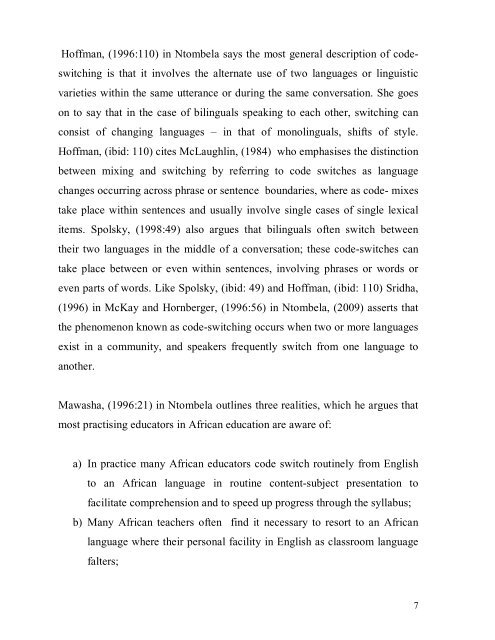error analysis: a study of errors committed by isizulu speaking ...
error analysis: a study of errors committed by isizulu speaking ...
error analysis: a study of errors committed by isizulu speaking ...
You also want an ePaper? Increase the reach of your titles
YUMPU automatically turns print PDFs into web optimized ePapers that Google loves.
H<strong>of</strong>fman, (1996:110) in Ntombela says the most general description <strong>of</strong> codeswitching<br />
is that it involves the alternate use <strong>of</strong> two languages or linguistic<br />
varieties within the same utterance or during the same conversation. She goes<br />
on to say that in the case <strong>of</strong> bilinguals <strong>speaking</strong> to each other, switching can<br />
consist <strong>of</strong> changing languages – in that <strong>of</strong> monolinguals, shifts <strong>of</strong> style.<br />
H<strong>of</strong>fman, (ibid: 110) cites McLaughlin, (1984) who emphasises the distinction<br />
between mixing and switching <strong>by</strong> referring to code switches as language<br />
changes occurring across phrase or sentence boundaries, where as code- mixes<br />
take place within sentences and usually involve single cases <strong>of</strong> single lexical<br />
items. Spolsky, (1998:49) also argues that bilinguals <strong>of</strong>ten switch between<br />
their two languages in the middle <strong>of</strong> a conversation; these code-switches can<br />
take place between or even within sentences, involving phrases or words or<br />
even parts <strong>of</strong> words. Like Spolsky, (ibid: 49) and H<strong>of</strong>fman, (ibid: 110) Sridha,<br />
(1996) in McKay and Hornberger, (1996:56) in Ntombela, (2009) asserts that<br />
the phenomenon known as code-switching occurs when two or more languages<br />
exist in a community, and speakers frequently switch from one language to<br />
another.<br />
Mawasha, (1996:21) in Ntombela outlines three realities, which he argues that<br />
most practising educators in African education are aware <strong>of</strong>:<br />
a) In practice many African educators code switch routinely from English<br />
to an African language in routine content-subject presentation to<br />
facilitate comprehension and to speed up progress through the syllabus;<br />
b) Many African teachers <strong>of</strong>ten find it necessary to resort to an African<br />
language where their personal facility in English as classroom language<br />
falters;<br />
7
















